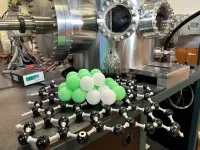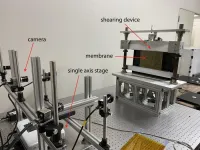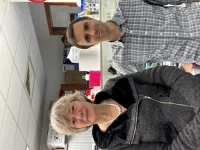(Press-News.org) Fiber is well known to be an important part of a healthy diet, yet less than 10% of Americans eat the minimum recommended amount. A new study from Stanford Medicine might finally convince us to fill our plates with beans, nuts, cruciferous veggies, avocados and other fiber-rich foods. The research, which will be published in Nature Metabolism on Jan. 9 identified the direct epigenetic effects of two common byproducts of fiber digestion and found that some of the alterations in gene expression had anti-cancer actions.
When we eat fiber, the gut microbiome produces short-chain fatty acids. These compounds are more than just an energy source for us: They have long been suspected to indirectly affect gene function. The researchers traced how the two most common short-chain fatty acids in our gut, propionate and butyrate, altered gene expression in healthy human cells, in treated and untreated human colon cancer cells, and in mouse intestines. They found direct epigenetic changes at specific genes that regulate cell proliferation and differentiation, along with apoptosis, or pre-programmed cell death processes — all of which are important for disrupting or controlling the unchecked cell growth that underlies cancer.
“We found a direct link between eating fiber and modulation of gene function that has anti-cancer effects, and we think this is likely a global mechanism because the short-chain fatty acids that result from fiber digestion can travel all over the body,” said Michael Snyder, PhD, Stanford W. Ascherman, MD, FACS Professor in Genetics. “It is generally the case that people’s diet is very fiber poor, and that means their microbiome is not being fed properly and cannot make as many short-chain fatty acids as it should. This is not doing our health any favors.”
Given the worrying rates of colon cancer in younger adults, the study findings could also spur conversation and research about the possible synergistic effects of diet and cancer treatment.
“By identifying the gene targets of these important molecules we can understand how fiber exerts its beneficial effects and what goes wrong during cancer,” Snyder added.
END
What we eat affects our health — and can alter how our genes function
2025-01-09
ELSE PRESS RELEASES FROM THIS DATE:
Lung cancer test predicts survival in early stages better than current methods
2025-01-09
ORACLE test predicts overall cancer survival independent of currently used clinical risk factors, and it has the best predictive power in stage 1 lung cancer.
A high ORACLE score is associated with a higher risk of cancer spread.
ORACLE could potentially be used to pick out patients who would benefit most from chemotherapy.
Researchers at the Francis Crick Institute, the UCL Cancer Institute and UCLH have shown that a test called ORACLE can predict lung cancer survival at the point of diagnosis better than currently used clinical risk factors. This could help doctors make more informed treatment decisions for people with stage ...
Pioneering new mathematical model could help protect privacy and ensure safer use of AI
2025-01-09
UNDER EMBARGO UNTIL 10 AM GMT / 5 AM ET THURSDAY 9 JANUARY 2025
Pioneering new mathematical model could help protect privacy and ensure safer use of AI
AI tools are increasingly being used to track and monitor us both online and in-person, yet their effectiveness comes with big risks. Computer scientists at the Oxford Internet Institute, Imperial College London, and UCLouvain have developed a new mathematical model which could help people better understand the risks posed by AI and assist regulators in protecting peoples’ privacy. The findings have been published today (9 January) in Nature Communications.
For ...
Floods, droughts, then fires: Hydroclimate whiplash is speeding up globally
2025-01-09
Key takeaways
Hydroclimate whiplash – rapid swings between intensely wet and dangerously dry weather – has already increased globally due to climate change, with further large increases expected as warming continues, according to a team of researchers led by UCLA’s Daniel Swain.
The “expanding atmospheric sponge,” or the atmosphere’s ability to evaporate, absorb and release 7% more water for every degree Celsius the planet warms, is a key driver of the whiplash.
Co-management of extreme rainfall or extreme droughts, ...
Scientists fuel sustainable future with catalyst for hydrogen from ammonia
2025-01-09
Scientists have created a catalyst for hydrogen generation from ammonia that becomes more active with time, and by counting atoms revealed changes that boost the catalyst’s performance.
A research team from the University of Nottingham's School of Chemistry, in collaboration with the University of Birmingham and Cardiff University, has developed a novel material consisting of nanosized ruthenium (Ru) clusters anchored on graphitized carbon. These Ru nanoclusters react with ammonia molecules, catalysing splitting ammonia into ...
Discovering hidden wrinkles in spacecraft membrane with a single camera
2025-01-09
Exiting Earth’s gravity takes an enormous amount of fuel and power. Due to this, spacecraft strapped to rockets are limited in their carry capacity and every gram must be accounted for. To lighten the load, thin membranes are being researched as alternative materials, but their plastic wrap property causes wrinkling that can affect operational performance. For this reason, there is a need to develop measurement technology that can accurately detect deformations.
Professor Takashi Iwasa at Osaka Metropolitan University’s Graduate School of Engineering led a team in developing a method for measuring the size of wrinkles ...
Women are less likely to get a lung transplant than men and they spend six weeks longer on the waiting list
2025-01-09
Women are less likely to receive a lung transplant and spend an average of six weeks longer on the waiting list, according to a study published today (Thursday) in ERJ Open Research [1]. However, women who receive a lung transplant are more likely than men to live for five years post-transplant. Based on their findings, the researchers encourage changes in regulation and clinical guidelines to address this inequality.
Lung transplantation is the only treatment for people with end-stage respiratory failure and patients on the waiting list have a high risk ...
Study sheds more light on life expectancy after a dementia diagnosis
2025-01-09
The average life expectancy of people diagnosed with dementia ranges from 9 years at age 60 to 4.5 years at age 85 for women and from 6.5 to just over 2 years, respectively, in men, finds a systematic review of the latest evidence in The BMJ today.
The results also suggest that one third of people with dementia are admitted to a nursing home within three years of diagnosis.
Nearly 10 million people worldwide receive a diagnosis of dementia every year, but survival estimates vary widely, and few ...
Tesco urged to drop an “unethical” in-store infant feeding advice service pilot
2025-01-09
UK supermarket giant Tesco is being urged to drop an “unethical” pilot of an in-store infant feeding advice service in which Danone-funded midwives are expected to wear branded uniforms and undergo training by the formula company, reveals an exclusive news report published by The BMJ today.
Critics say that the initiative, running in Tesco’s flagship store and set to be rolled out shortly, is a backward step and reminiscent of the “milk nurses” scandal of the 1970s, where formula industry salespeople dressed as nurses and promoted formula milk to parents.
One midwife hired by Danone quit ...
Unraveling the events leading to multiple sex chromosomes using an echidna genome sequence
2025-01-09
Unraveling the Events Leading to Multiple Sex Chromosomes Using an Echidna Genome Sequence
A nearly gapless genome sequence of the echidna, an egg-laying mammal with multiple sex chromosomes, helps researchers to track genomic reorganization events that gave rise to a highly unusual sex determination system.
The short-beaked echidna (Tachyglossus aculeatus) is one of Australia’s most iconic animals. Belonging to a unique group of mammals called “monotremes” (with the platypus as the other prominent member). Echidnas may at first glance be mistaken for a weird-looking hedgehog, ...
New AI platform identifies which patients are likely to benefit most from a clinical trial
2025-01-08
A new study led by Winship Cancer Institute of Emory University and Abramson Cancer Center of University of Pennsylvania researchers demonstrates that a first-of-its-kind platform using artificial intelligence (AI) could help clinicians and patients assess whether and how much an individual patient may benefit from a particular therapy being tested in a clinical trial. This AI platform can help with making informed treatment decisions, understanding the expected benefits of novel therapies and planning ...



